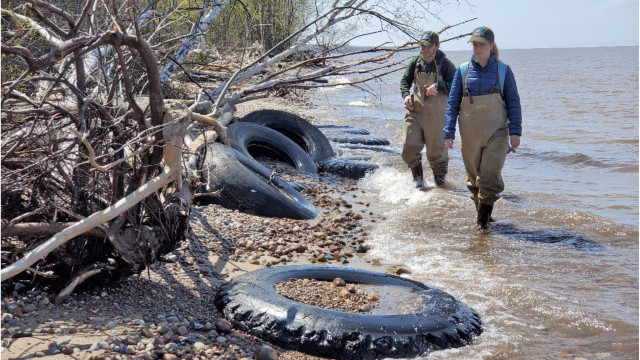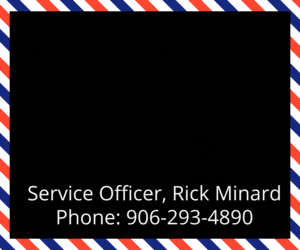More than 200 miles of Lake Superior shoreline recently benefitted from a group effort that removed more than 10 tons of debris from the shoreline.
The Superior Watershed Partnership (SWP) in cooperation with local partners, utilized funding awarded by the National Oceanic and Atmospheric Administration (NOAA) Marine Debris Program to host coastal cleanups, beach hikes, and diving events for the Keweenaw Bay Indian Community, Bay Mills Indian Community, City of Marquette, and City of Munising. The SWP deployed the Great Lakes Climate Corps (GLCC) to hike over 200 miles of coastline and pick up debris along the way.
Community volunteers and local dive teams also assisted SWP staff and the GLCC with the removal of underwater debris. Debris removed included tires, consumer waste such as plastic products, anchors, derelict fishing gear, bicycles, household appliances, and other assorted materials. The SWP plans to host additional cleanup events in 2024.
“We like to think of Lake Superior, the world’s largest freshwater lake, as a pristine and remote gem of the region,” said Haley Dalian, Great Lakes regional coordinator for the NOAA Marine Debris Program. “While it unfortunately faces marine debris issues that are common to all the Great Lakes, the Superior Watershed Partnership is making a real impact through their community-supported, large-scale debris removal.”
Marine debris is any solid, human-created waste that has been accidentally or deliberately released into the Great Lakes or ocean waters. Marine debris impacts aquatic habitat, injures or kills fish and other wildlife, and interferes with navigation safety. Marine debris includes a wide range of items both small and large, from microplastics to abandoned and derelict vessels. Sources of marine debris include stormwater runoff, littering, industrial activities, unregulated construction sites, and illegal dumping.
Great Lakes Climate Corps crews will work with Lake Superior Tribes and coastal communities to remove marine debris from shorelines, harbors and nearshore waters.
To address the marine debris problem in the Upper Peninsula, the SWP has mobilized its Great Lakes Climate Corps and community partners to implement a series of cleanups with coastal communities and Tribes.
While the SWP has conducted annual beach cleanup events for over two decades, NOAA funding allows the program to provide more services and serve more communities. “The SWP and GLCC are excited to continue implementing debris removal and cleanup events that benefit not only Lake Superior but also the communities that rely on the health of our Great Lake,” said Kathleen Henry, Education Specialist at SWP.
Communities, Tribes, and other Lake Superior coastal property owners are encouraged to contact the SWP with information on large debris locations, potential beach cleanup sites, or related marine debris removal sites. This project is funded through a NOAA Marine Debris Program grant with cleanup events taking place through August 2024.
For more information, please contact Kathleen Henry at kathleen@superiorwatersheds.org







